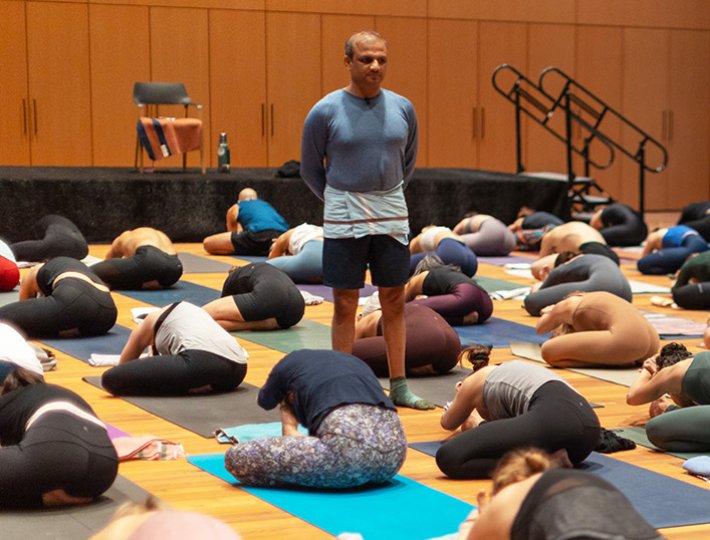When you first decide to begin a meditation practice, there’s a natural tendency to focus on the concrete aspects of the process. What is meditation? How do I learn to meditate? What should I do if I can’t sit still? While this exploration is practical and necessary, there’s another question you should first ask yourself that’s even more important to unlock all the potential of the practice: Why do I meditate?
If you’re like many new Western practitioners, you might seek the benefits that students of contemplative traditions have long lauded: a more stable mind, greater clarity, a deeper sense of connectedness. Or perhaps you’re swayed by the mounting scientific research illuminating the cognitive improvements that meditation provides. Or maybe you want to be 10 percent happier, like Dan Harris, or thriving in work and life, like Arianna Huffington.
The benefits of the practice are real, but they are not the why. Don’t get me wrong—attaining these outcomes is desirable! But establishing pure motivation in your practice and diminishing expectations to the best of your ability are ultimately the keys to finding the clarity you seek.
What is Pure Motivation?
The myriad schools of Mahayana Buddhism are all predicated on the principle that genuine happiness stems from the wish to benefit others. This recognition is the source of pure motivation. Therefore, the aspiration before meditating should be: “May I practice meditation so that I may benefit others. May I train my mind to be calm, kind, and clear so that I can bring about the happiness of everyone.”
Developing this motivation is not simply an ethic; it is a skillful method that will amplify your practice. When we turn our minds outwards, we loosen the fictional narratives that arise endlessly out of self-reference and open into a space that is much more vast than the closet of our own obsessions. It sounds complicated, but the idea is actually quite simple. For example, say that you have, through various reasons, come to believe that you are incapable of public speaking. Due to a class speech you botched in 5th grade, you have spent years neurotically developing a story in your mind about how you cannot talk in front of others without freezing up. Your fixation on this story is precisely what paralyzes you, and every time you close up in front of others, the story becomes more “real.”
When we turn our minds toward helping others, we come to see clearly that each person is caught within his or her own story about who they are and who they are not. We see that, at root, everyone simply wants happiness and is desperately trying to modify his or her story to attain this happiness. Through training in stability and pure motivation, we cultivate the ability to interact sensitively with the space inside others that desires fulfillment, the space that is driving these stories. And with clear recognition that these narratives are artificial, we can speak with wisdom into that sensitive space. Opening into that space lends our practice purpose, a sense of connectedness, and a profound feeling of awe.
Some bristle at the idea that meditating is of any real help to others. Through a purely materialist lens it seems that when one is on the cushion, one is not producing anything, not giving anything at all. It’s true that the benefit of training cannot be accounted for by a material metric, but it’s also obvious that the purity of a mind unfettered by self-referential obsessive thoughts about how you stack up against others, about your inferiority or superiority, and about what you can obtain for yourself, is more capable of responding skillfully to the needs of other people. For a person with such a pure mind, the well-being of others becomes the well-being of herself. A skillful motivation combined with practices that emerge from a genuine lineage can produce this type of incredibly refined mind. First, however, we have to want that kind of mind.
Pure motivation arises out of the recognition that although humans experience vast degrees of suffering due to various differences in environment, health and healthcare, education, familial structures, and an infinite number of causes and conditions, we are all, nevertheless, suffering. We must understand what causes that suffering and make sure our meditation practice is aimed at reducing and transcending those causes, rather than furthering them.
How can meditating with the wrong motivation further one’s suffering? Say you and your father disagree about politics, and you think that showing him how knowledgeable you are at the Thanksgiving table this year will satisfy you. It is possible to train in stability and clarity with the intention to hyper-refine your ability to develop cutting arguments, but you are ultimately meditating to secure your position, rather than with the intention to create harmony. Perhaps it will even reduce the possibility of gently coming to some understanding of each other’s position.
The Four Mind Changings
In the Tibetan Buddhist system, there are four analytical contemplations that turn the mind of a practitioner away from the five mental poisons of attachment, pride, jealousy, anger, and stupidity, that perpetuate the suffering of self and other. Even though many secularized meditative exercises are extracted from the Buddhist framework, these four preliminary practices are often overlooked and yet are so profound.
First, we must examine the preciousness of our human life. Of the trillions of creatures on this earth (let alone within the vastness of the universe), it is inconceivably rare to be born as a human—with splendid cognitive faculties, with the capacity for self-awareness, and with the freedom to actually train in meditation. How good it is that we are not yoked to an ox-cart, or confined in a cage until we are slaughtered? Furthermore, there are billions of people born into circumstances in which food and water and clothing are eternally elusive. It is a privilege to be a human who actually has access to meditative instruction. We must ask ourselves, what do I want to achieve with this precious opportunity? Am I making good use of my limited time here?
Second, we examine the impermanent nature of all things. We actually come to recognize, not simply intellectually, but deep in our bones, that all of our friends and family will die. We must be shocked into our training. Obsession with attaining worldly name, fame, and power becomes absurd against the backdrop of clearly seeing that all things are subject to decay. Treasuring life stems largely from the recognition of its fleetingness. The Soto Zen master, Ekai Korematsu Sensei, once told us, “For the Buddha, every breath was his last.” You might train in while breathing, thinking, “This is my last breath. This is my last breath.”
Third, we train in seeing that every action has a consequence. This is the law of karma and is nothing other than an observation of cause and effect. If you set a cup on a table, it changes the landscape of the table. It means that at some point you’ll have to pick up that cup, or someone else will. If you snap at a friend, she will be hurt. If you smile, she will warm. The various methods of meditation allow us to see more clearly the effects of our actions and gain more control in producing positivity. We practice by bringing attention to each of our actions and noticing their effects. Fourth, we acknowledge the deficiencies of continuing to indulge our bad habits and come to renounce the cognitive and emotional blind spots that prevent us from experiencing life deeply. We continue to play out, again and again, patterns of behaviors that cause us to suffer. We must not simply see the deficiencies of coming home each night and pouring ourselves a drink—we must examine everything: the unconscious aggressive tones in our voices when speak to our siblings, the anger that flares up when someone cuts us in line, the dull desensitization that swathes us when we hear of another atrocity on the news. We need to understand how we are fettered by those patterns and then genuinely want to be free from them.
When we see the sadness of our own situation, we open to the sadness of others. At a recent meditation retreat in upstate New York, Lama John Makransky, Boston College professor and author of the book Awakening Through Love, said, “Through practice we come to recognize that there never was a They. There was only ever an Us.” When we examine our experience through the Four Mind Changings, we give rise to the tenderness that nourishes that recognition. This tenderness is the source of pure motivation, as it naturally encourages us to recognize the precious existence we all share, which in turn produces gratitude, renunciation from activities that don’t contribute to our happiness or the happiness of others, and a deep longing to realize a stable source of internal well-being. When this happens, our meditation naturally flourishes.
All this is not to say that there is only one way to approach meditation, or that the Buddhist framework is monolithically superior. There are practices that cultivate stillness and clarity. There are practices that generate loving kindness, compassion, sympathetic joy, and equanimity. There are practices that are so essentially subtle and profound that only a master who holds the unpolluted lineage of an authentic wisdom tradition can teach them. All of these methods of training are indescribably powerful and should be investigated. But it would be foolish to practice any of them without understanding why. If we don’t clarify our motivation, the flailing that constitutes so much of our current experience will almost certainly continue to play out in our minds when we sit upon the cushion.








Comments (1)